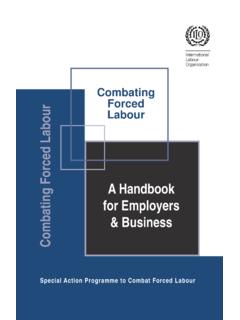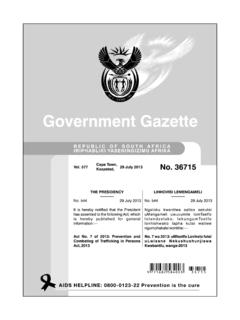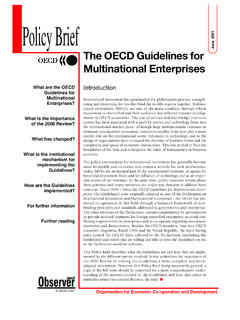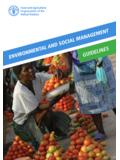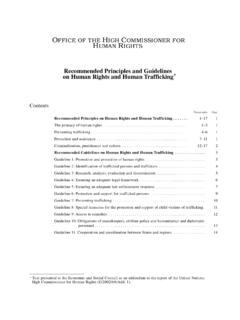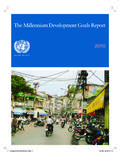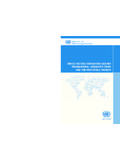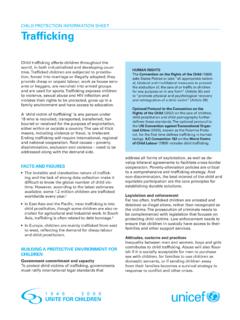Transcription of Kering Code of Ethics English
1 CODE OF Ethics CONTENTSF oreword by Fran ois-Henri Pinault Page 2 Our ethical principles in the conduct of businessPage 3 Our principles of business practice and behaviour towards our principal stakeholdersPage 8 Group Suppliers CharterPage 10 Monitoring the application of the CodePage 12 Some questions and examples to help apply the Code Page 13 ContactsFOREWORD BY FRAN OIS-HENRI PINAULTC hairman and Chief Executive Offi cerEthical behaviour and sustainability are at the heart of the way the Group does business. There is no sustainable business without trust. And this trust is based above all on our ability to demon-strate our day-to-day commitment to responsible business the Group s fi rst Ethics Charter in 1996, great progress has been made in continually reinforcing our ethical pledge. Milestones include the publica-tion of the Code of Ethics and its distribution to all Group employees in 2005 and again in 2009; the creation of a Sustainability Department, which is represented on the Group s executive committee; ratifi cation of the UN Global Compact in 2008 and the creation of the Kering Foundation which fi ghts violence against women.
2 These are all demonstra-tions of our determination to make Ethics and sustainability the cornerstones of our business activities. More recently, the strengthening of our governance in the area of sustainability and the adoption of ambitious and concrete objectives for the coming years again testify to our determination and the seriousness of our third edition of our Code of Ethics provides the opportunity to restate our beliefs and the ethical principles that must take precedence wherever we operate. Structured by type of stakeholder, the Code of Ethics sets out the points of reference that must guide every individual s actions. These cover: respect for employees, gender equality in every aspect of professional life, fighting all forms of corruption and fraud, combating child labour, application of the major conventions of the International Labour Organisation, respect for the environment, listening to civil stakeholders and mobilising our workforce alongside local update provides the opportunity to enrich the Code by including our Suppliers Charter and by adopting the precautionary principle, particularly in the area of environmental protection.
3 Lastly, this new version presents the development of the Ethics organisation within the Group and possible avenues of recourse for employees who, whether victim or witness, suspect a failure to comply with one of the Group s ethical ethical matters, what we believe and permit and what we discourage and forbid cannot be repeated often enough. In the face of new issues and new challenges, tenacity, vigilance and continu-ous improvement are the pillars of this pragmatic approach. At a time when our Group is completing its transformation by becoming a world leader in apparel and accessories in both the Luxury and Sport & Lifestyle markets and adopting its new name, Kering , it is essential to remind everyone that nothing can or should be done outside a precise and demanding ethical framework the only pos-sible guarantee of longevity and would like every one of us to adopt this Code of Ethics when performing our daily tasks. Only then can we embody the spirit of Kering .
4 "ONLY A Str ICT ETHICAL fr AMEWORK ALLOWS US TO HAVE SUSTAINABLE GROWTH." Nicolas Morice2 Kering TAKES CARE TO BEHAVE WITH INTEGRITY AND RESPONSIBILITYT aking an ethical approach to business under all circumstances guarantees longevity. Success and sustainable development in our markets depend on the trust of our customers, employees, shareholders, and commercial and social partners. This trust is built over time and has to be earned day in and day in a business environment covers many issues that may sometimes appear contradic-tory. This is especially true when speaking about a group of brands operating on every continent, in countries with diff erent cultures, at varying stages of economic , these differences can be structured through a small number of simple but powerful shared principles, which in the spirit of respon-sibility and common sense should guide our ETHICAL PRINCIPLES SHARED BY ALL EMPLOYEES ARE TO: Behave with integrity and a sense of responsibility; Comply with applicable laws and regulations; Respect the dignity and rights of each individual; Act with respect for the natural environment; Use the company s goods and resources with the interests of the Group and its shareholders in mind; Support our employees initiatives in community involvement and sustainability.
5 Respect business confi implementation of these ethical principles should, above all, be based on a fair, honest, posi-tive and creative attitude taken by GROUP S RULES OF BUSINESS CONDUCT REFLECT SEVERAL INTERNATIONAL STANDARDS, INCLUDING: The United Nations Universal Declaration of Human Rights and the European Convention on Human Rights; Various International Labour Organisation conventions, notably conventions 29, 105, 138 and 182 (child labour and forced labour), 155 (occupational safety and health), 111 (discrimi-nation), 100 (equal remuneration), 87 and 98 (freedom of association and protection of the right to organise and collective bargaining ); The OECD Guidelines for Multinational Enter-prises; The United Nations Convention on the Rights of the Child; The Ten Principles of the United Nations Global ETHICAL PRINCIPLES IN THE CONDUCT OF BUSINESS3In addition to the principles stated above, it is essential to define the principles of conduct and behaviour shared by all employees, both at a personal level and in respect to the different people with whom we are in constant or occasional are conscious of our duties and responsibilities towards:OURSELVESWe are duty bound to act with integrity, loyalty and a sense of responsibility.
6 In particular, we have to ensure that we do not get involved in situations that could prove fraudulent (corruption, confl icts of interest, misappropriation of assets, communi-cation of fraudulent information, etc.).In general, we must adhere to the Group s ethical principles and protect its interests in our day-to-day business activities, at our place of work and when travelling on COLLEAGUES AND STAFFR espect for human rights and the lawWe owe our colleagues and staff respect and fair treatment, and we need to do our utmost to cre-ate a motivating work environment that fosters their development. We aim to promote a human resources policy that contributes to the profes-sionalism, motivation and fulfilment of each individual by providing opportunities for training, job mobility, internal promotion and development of provide working conditions that comply with human rights, social legislation and environmen-tal, health and safety laws and fi ght against child and forced labour.
7 We encourage freedom of speech for the Group s staff .We encourage dialogue and respect the free exer-cise of unions rights within the context of local laws and PRINCIPLES OF BUSINESS PRACti CE AND BEHAVIOUR TOWARDS OUR PRINCIPAL STAKEHOLDERS4 Non-discrimination, diversity and equal opportunityWe do not tolerate discrimination, intimidation or harassment. We set out to promote equal oppor-tunity and treatment, believing that an organi-sation whose employees include the full range of diversity of the society in which it operates (especially in terms of gender, age, origin, sexual orientation or disability) has a real economic and competitive advantage. In this framework, we confi rm in particular our commitment to greater diversity and equality. We are working towards a better male/female balance at every level of man-agement in order to put an end to the waste of female talent throughout the chain of CUSTOMERS AND CONSUMERSH onesty, safety and qualityWe provide our customers with the very best professional service to ensure they are satisfi ed and to earn and maintain their trust.
8 Through its brands, the Group designs and markets products and services that comply with current standards and regulations with regards to quality, safety, industrial and intellectual property rights, and provides accurate, reliable and fair public relations and advertising are based on honesty and fairness, and always keep consumer safety in of personal and confi dential dataOur customers retain the power to make decisions about the information that they entrust to us. We ensure that our customer s personal data remain compliant with the law and confi dential in accord-ance with the promises we make to ENVIRONMENTWe respect the environment and do what is required for the sustainable development of our are taking ambitious and concrete measures to minimise the impact of our activities on the environment and society by adopting proactive procedures based on best business practices and beyond, through our impact beyond our own operationsThe actions developed by the Group aim to not only reduce and alleviate the Group s environmental impact, but also to develop, within its spheres of activity, projects with a positive impact on populations and their this respect, the Group is committed to meas-uring the impact of its activities, not only in the areas where it operates directly, but beyond, throughout its various supply chains.
9 Back to the extraction of the raw materials needed to produce the goods and services offered by the Group s brands. To this end, the Group produces an envi-ronmental profi t and loss account (EP&L).5 Priorities for actionKering s environmental policy puts special emphasis on: the Group s CO2 emissions and compensation for residual emissions through programmes that contribute to the well-being of local com-munities and the conservation of biodiversity; the use of water; the reduction of waste; the gradual elimination of hazardous chemicals in production processes; the responsible sourcing of raw materials that are in the products offered by the Group s brands, especially: gold, diamonds, leather, pre-cious skins, fur, cotton, paper and encourage the sharing and implementation of best practices, considering them to be a positive feature of our management. These include: energy savings, lower processing and recycling costs, among are introducing indicators to assess our actions in relation to our principal effects on the environment and to implement short- and medium-term action , we are committed to implementing the precautionary principle regarding environmental protection.
10 Consequently, we introduce risk assess-ment procedures and implement temporary and proportionate measures when current scientific knowledge shows there is potential for damage that could have a serious and irreversible eff ect on the SOCIETYD ialogue with stakeholders and economic and social developmentWe restate our commitment to human rights and intend to act as a socially responsible company wherever we pay close attention to the concerns expressed by international institutions, non-governmental organisations (NGOs) and representatives of civil society and wish to foster open dialogue with respect the culture of the countries in which we most countries where we operate, we are involved in community, educational or cultural FoundationAs part of its sustainability strategy, Kering encour-ages its brands and employees to support com-munity programmes and to get involved for the benefi t of women, particularly through the Kering Corporate Foundation which combats violence against women.

